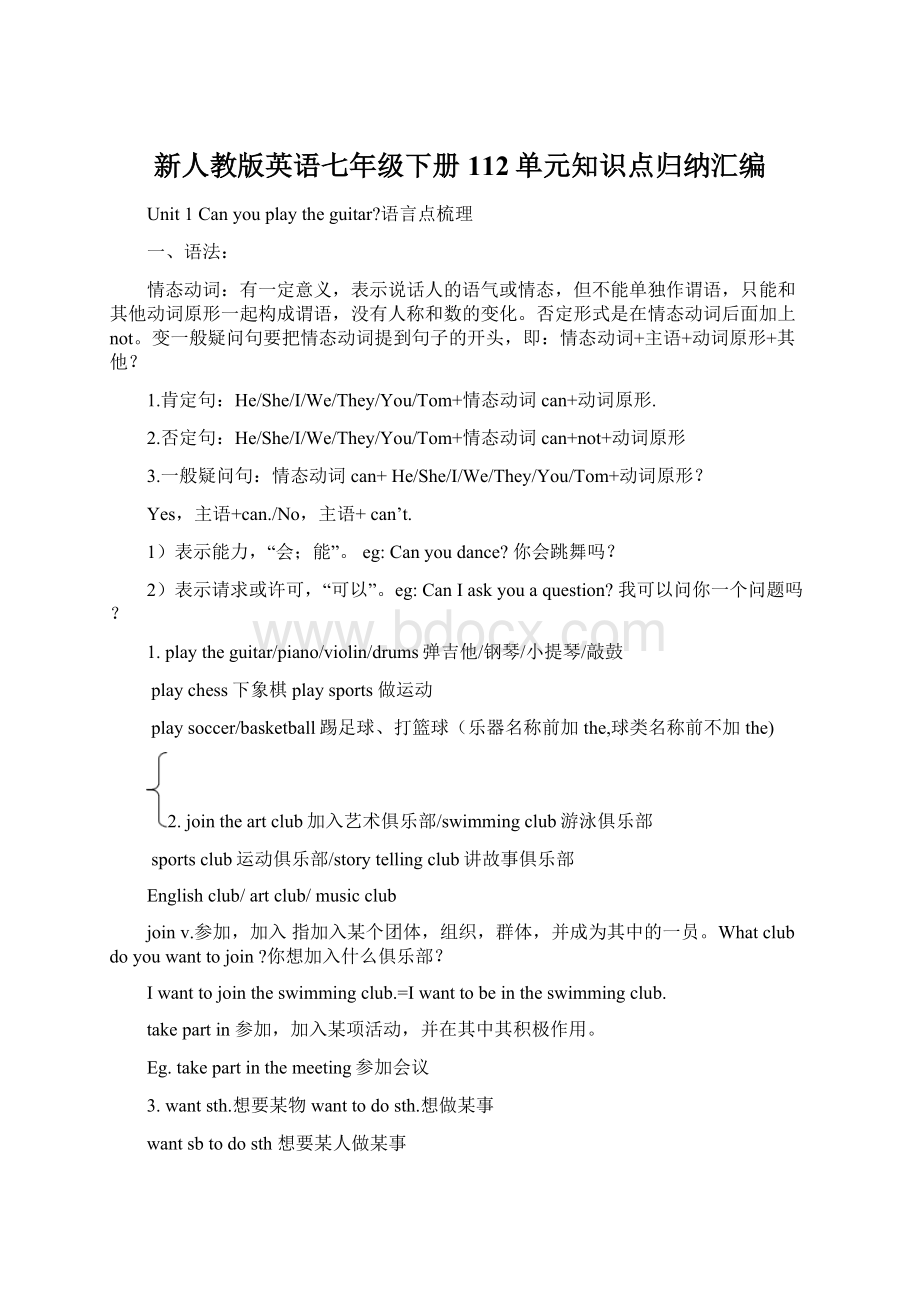新人教版英语七年级下册112单元知识点归纳汇编Word文档格式.docx
《新人教版英语七年级下册112单元知识点归纳汇编Word文档格式.docx》由会员分享,可在线阅读,更多相关《新人教版英语七年级下册112单元知识点归纳汇编Word文档格式.docx(31页珍藏版)》请在冰豆网上搜索。

能”。
eg:
Canyoudance?
你会跳舞吗?
2)表示请求或许可,“可以”。
eg:
CanIaskyouaquestion?
我可以问你一个问题吗?
1.playtheguitar/piano/violin/drums弹吉他/钢琴/小提琴/敲鼓
playchess下象棋playsports做运动
playsoccer/basketball踢足球、打篮球(乐器名称前加the,球类名称前不加the)
2.jointheartclub加入艺术俱乐部/swimmingclub游泳俱乐部
sportsclub运动俱乐部/storytellingclub讲故事俱乐部
Englishclub/artclub/musicclub
joinv.参加,加入指加入某个团体,组织,群体,并成为其中的一员。
Whatclubdoyouwanttojoin?
你想加入什么俱乐部?
Iwanttojointheswimmingclub.=Iwanttobeintheswimmingclub.
takepartin参加,加入某项活动,并在其中其积极作用。
Eg.takepartinthemeeting参加会议
3.wantsth.想要某物wanttodosth.想做某事
wantsbtodosth想要某人做某事
4.begoodat(doing...)擅长于=dowellin在某方面做得好
begoodwith与…相处的好begoodfor对…有益
5.liketodosth.喜欢做某事likedoingsth.
6.Let’sdosth.让我干…let/makesb.dosth.使某人做某事
10.writestories写故事
writetosb=writealettertosb=writesbaletter
11.tell/speak/say/talk的用法
1)tell讲述一件事实或故事等及物动词
tellsb.sth给某人讲某事=tellsthtosb把某事告诉某人
tellsb.todosth告诉某人做某事
tellstories讲故事=tellastorytellalie撒谎
2)speakv.主要是讲说话的能力,往往接语言speakEnglish讲英语
3)talk为不及物动词往往加介词再接宾语
talktosb.和…交谈/talkwithsb.和…交谈(指双方)
4)say往往接说话的内容eg.Ourteachersaysweshouldstudyhard.
sayitinEnglish用英语说它
12.makefriendswithsb.和…交朋友
13.playgameswithsb.和…做游戏
14.helpsb.withsth.=helpsb.(to)dosth.帮助某人做某事
15.callsb.at+电话号码给某人打电话拨+号码
16.on/attheweekend在周末onweekendsafterschool放学后
17.doChinesekungfu打中国功夫
18.befree空闲的
19.singverywell唱得好Thatsoundsgood.那听起来很好
20.English-speakingstudents讲英语的学生
21.Students’SportsCenter学生运动中心
23.also/too/either
also/too用在肯定句,also用于句中,too用于句尾,either用于否定句句未eg.Iamastudent.Heisastudent,too.Iamastudent.Heisalsoastudent.
Iamnotastudent.Heisnotastudent,either.
24.and/or连接两个并列成分eg.Icansinganddance.(and用于肯定句)
Ican’tsingordance.(or用于否定句)
Canyousingordance?
(or用于选择疑问句“或者”)
25.attheoldpeople’shome在养老院
27.needtodosth需要干某事needsb.todosth需要某人干某事
28.wantedstudentsforSchoolshow学校表演招聘学生
v.展示;
给….看…showsb.Sth=showSthtosb.给某人展示
n.节目;
表演TVshow电视节目
29.teachv.教,讲授teachern.教师teachsb.English教某人英语
teachsb.sth.=teachsthtosb.教给某人某事=教某事给某人
teachsb.todosth教给某人做某事
30.musicn.音乐musiciann.音乐家
31.piano(pl.)pianos
Unit2Whattimedoyougotoschool?
知识点梳理
1.Whattimedoyougetup?
Whattime+助动词do/does+主语+动词原形,询问某人做某事的具体时间。
whattimedoyoubeginclassinthemorning?
2.What’sthetime=Whattimeisit?
是用来询问具体时刻,意为“几点了”。
用it作答。
What’sthetime?
It’s7:
30.几点了?
七点半了。
英语时刻的表达法:
顺读法和逆读法。
顺读法:
钟点数+分钟数。
4:
25→fourtwenty-five,6:
58→sixfifty-eight,
7:
00→seveno’clock说明:
这种表达不论分钟数是多少,均可使用。
逆读法:
分钟为+介词to/past+钟点数,可分两种情况:
1)分钟为不超过半小时,用分钟数+past(/past/过)+钟点数。
4:
23→twenty-threepastfour,5:
19→nineteenpastfive.
2)分钟数超过了半小时,用(所差的)分钟的+to+(下一个)钟点。
31→twenty-ninetoeight,10:
58→twotoeleven
英语习惯上把十五分钟(fifteen)称作一刻aquarter,三十分钟(thirty)称为half/half,因此10:
30,可以用两种表达方式,halfpastten,tenthirty。
10:
45读作aquartertoeleven
3.gotoschool去上学gotowork去上班gotobed上床睡觉gohome回家
4.gethome到家gettoschool到达学校
getup起床getupearly起床早
getdressed穿衣服(表示动作)eg:
Let’sgetdressedandhavebreakfast.
dresssb给某人穿衣服Shealwaysdressesherselfalthoughsheisonlyoneyearold.
bedressedin穿衣服相当于wearIamdressedinabluecoat.
5.brushone’steeth刷牙(teeth的单数tooth)(三单brushes)
6.eat/havebreakfast/lunch/dinner吃早餐(一日三餐前不加the)
eatagoodbreakfast.吃了一个丰盛的早餐
7.takeashower=haveashower洗澡
8.take/haveawalk散步=goforawalk=walk
10.doone’shomework做家庭作业
11.cleanmyroom打扫我的房间Myroomisclean.
12.eatice-cream吃冰激凌eatalotof/lotsoffruitandvegetables吃许多蔬菜和水果
13.do/playsports做运动
14.eatquickly快速的吃quick形容词,快的。
加ly变成副词形式
15.playcomputergames玩电脑游戏
16.Heworksataradiostation.
work:
人们日常工作和生活中从事的体力和脑力劳动,各类工作。
不可数名词
job:
指具体的职业或工作。
可数名词
17.3Whatafunnytimetoeatbreakfast!
感叹句:
(1)Whata/an+形容词+单数名词+主语+谓语!
whatagoodgirlsheis!
(2)What+形容词+可数名词复数+主语+谓语!
Whatgoodgirlstheyare!
(3)What+形容词+不可为名词+主语+谓语!
Whatterribleweatheritis!
(4)How+形容词+the+主语+谓语!
Howterribletheweatheris!
Howgoodthegirlis!
18.Iusuallygetupatfiveo’clock.
1)句中usually与often一样都是频度副词,常用于动词be助动词和情态动词之后,用在行为动词之前。
always意思是“总是”、“永远”,表示动作重复,状态继续,中间没有间断。
Eg:
Wealwaysgetupbeforesixo'
clock.Heisalwaysthinkingofothers.
always>
usually>
often>
sometimes>
seldom>
never(表示频率大小)
2)介词at常用于具体时刻之前,意义为在…,如:
at5:
00在5:
00钟。
on,at,in这三个常用介词都可以表示时间和地点,但具体用法不同.
①on用在日期、星期几、节日前,也表示在具体某一天及具体某一天的上午、下午和晚上。
onNovember1stonMondayonChildren’sDayonTuesdayevening
②in用于月份、季节、年份前,当early,late用于句